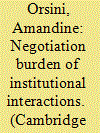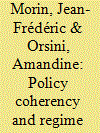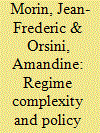|
|
|
Sort Order |
|
|
|
Items / Page
|
|
|
|
|
|
|
| Srl | Item |
| 1 |
ID:
153886


|
|
|
|
|
| Summary/Abstract |
The participation of non-state actors in international politics has been investigated since the creation of international institutions. Yet, the rules, principles and norms of global governance are no longer discussed in single isolated institutions. Rather, with the proliferation of international regimes and organizations, international issues are now negotiated in a context of institutional interactions known as ‘regime complexes’. This poses new questions, in particular on the negotiation burden that these new processes place on international actors. To answer this question, this contribution compares non-state participation in both contexts (single regimes and regime complexes), using the international forest negotiations as a case study. It uses quantitative methods to measure the negotiation burden of single regimes and compare it with the negotiation burden of regime complexes. The negotiation burden of single regimes is found to be insignificant, political interest being the major motivation for participation, while the negotiation burden of regime complexes is found to be real, demanding a certain type of material and organizational resources in order for non-state actors to participate. Yet a certain diversity of non-state representation is maintained within regime complexes, non-governmental organizations being dominant with respect to business groups.
|
|
|
|
|
|
|
|
|
|
|
|
|
|
|
|
| 2 |
ID:
131708


|
|
|
|
|
| Publication |
2014.
|
| Summary/Abstract |
This study argues that 'regime complexes' and 'policy coherence' are two faces of the same integrative process. The development of regime complexes co-evolves with the pressures on decision makers to coordinate their policies in various issue-areas. Conceptually, we introduce a typology of policy coherency (erratic, strategic, functionalistic, and systemic) according to its procedural and substantive components. Empirically, by triangulating quantitative and qualitative data, we use this typology for the case of the genetic resources' regime complex to illustrate the links between regime complexes and policy coherency. Our results suggest that a coherent policymaking process favours integrated regime complexes, while greater exposure to a regime complex increases the pressure to have a coherent policymaking. This study fills a gap in the literature on regime complexes by providing a micro-macro model linking structure to agency.
|
|
|
|
|
|
|
|
|
|
|
|
|
|
|
|
| 3 |
ID:
117940


|
|
|
|
|
| Publication |
2013.
|
| Summary/Abstract |
Understanding the impact ofregime complexes on global governance calls
for creative policy thinking. This introduction provides a new and more
precise definition of the concept of regime complex. It also suggests specific tools to characterize regime complexes and analyze their impacts on
global governance. The articles in this issue deepen the analytical understanding of complexes by examining concrete examplesin various domains
of global governance such as piracy, taxation, energy, food security, emissions reduction, carbon sinks, biosafety, and refugee governance. In addition to providing an in-depth description of a variety of different regime
complexes, this issue is innovative on three accounts: (1) it presents complexes as both barriers and opportunities for global governance and gives
explanations for these diverse outcomes; (2) it shows how a broad spectrum of actors is necessary for understanding the creation and evolution
of complexes; and (3)it qualifiesformer claimsto the effectthat only powerful actors can impact regime complexes. institutional density.
|
|
|
|
|
|
|
|
|
|
|
|
|
|
|
|
| 4 |
ID:
117941


|
|
|
|
|
| Publication |
2013.
|
| Summary/Abstract |
This article looks at regime complexes from a state policymaking perspective. It develops a theoretical model in which regime complexes become
denser over time while governmental policymaking becomes more coherent. Underthis model, interactions between globalregime complexes and
national policymaking are twofold. On the one hand, greater policy coherence generates negotiated mandates asking for regime connections
and complex density. On the other hand, regime-complex density creates
more cohesive audiences, which increase incentives for national policy coherence. This co-adjustments model bringsstatesinto the discussion ofinstitutional interactions and critically questions the desirability and
feasibility of recent calls for joined-up government and whole-of-government approaches.
|
|
|
|
|
|
|
|
|
|
|
|
|
|
|
|
|
|
|
|
|